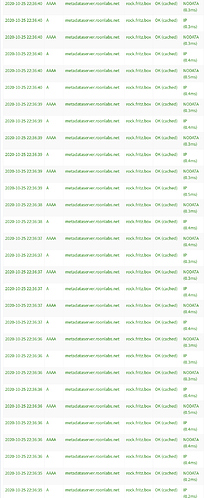I see 1000’s of requests to the same url every few days, shouldn’t ROCK just cache it?
It’s probably to facilitate failover/load balancing. Your pihole is caching it, however.
Hi @mikeb,
I checked with the team and it looks like what you’re seeing are regular metadata updates that occur in the background. It is expected that there will be many requests depending on the size of the library and number of updates occurring.
Thanks!
Dylan, I don’t mean to be rude but firing off thousands or tens of thousands of DNS requests at the same time impacts the performance of every device on the network behind the same firewall. DNS requests are one of the EASIEST ways to attack (on purpose or not) a security device. Tens of thousands of small packets all hitting a firewall or router at the same time although “normal” in the eyes of your developers are crappy behavior for an application. I would suggest to you that you ask your developers to find a new way to handle these requests.
I don’t think its normal either, normal for Roon perhaps, but not normal to pound the dns with the same lookup thousands of times within milliseconds. The TTL is far too short.
My ROON box made over 45,000 requests in a one hour period yesterday… when the requests are made seems to be related to what time the ROON server was restarted repeating daily at the same time.
Good information here, maybe this is the reason why people need to switch DNS servers (me included) to get Roon working… Hopefully in future this will be improved!
I’ve found ROCK to be way, way more chatty (DNS requests) than RoonServer on Windows 10. Same library.
Do you know what a DNS request does? It converts a domain name to an IP address…
It’s like a phone book…you look up a name and you get back a number. This is how the internet works folks. Roon looks up a lot of sites to get information so get over it.
DNS service is the phone book of the internet.
Do you know what DNS TTL (time to live) is? It tells you how long your lookup is good for, preventing you from requesting the same record over and over and over again. For roonlabs.com, the TTL is 30 seconds. It would appear that rock isn’t respecting this.
Mike 30 seconds is an insanely short TTL as it pretty much means that there will be no caching happening and their DNS servers are likely to be hammered.
I just had a look at mooblabs.com and it is 60 mins which is much more sensible. They might have been doing a migration or something as we tend to make ours very short when we are doing something like that.
Regards
Mike
Typo? On mooblabs…
Ged typo from my end 
…
It’s the default, and should still be locally respected and cached.
I’m showing 30 secs, I guess it depends who you ask.
Mike I don’t disagree with that statement at all, but the whole DNS system is based around caching and not hammering the core name server’s to hard or making unnecessary requests over and over again, unless the result is likely to have changed in the meantime.
I am assuming that Roon have a good reason for this choice, but it is a strange choice (and yes it should be respected).
Most external dns servers that I have used use a default of 10, 15 or 30 minutes (even 60 minutes) for TTL for the reason stated above.
I have never used one that defaults to 30 seconds, but there are more that I haven’t used than I have so happy to be completely wrong on this one.
Regards
Mike
No Mike it was a typo from my end as I typed moon and not Roon
Regards
Mike
I’m sure you’ve done the same test: Cloudflare 30 seconds, Google 29 seconds, nextDNS 5 seconds:
% dig +nocmd +noall +answer roonlabs.com @1.1.1.1
roonlabs.com. 30 IN A 151.101.1.195
roonlabs.com. 30 IN A 151.101.65.195
% dig +nocmd +noall +answer roonlabs.com @8.8.8.8
roonlabs.com. 29 IN A 151.101.1.195
roonlabs.com. 29 IN A 151.101.65.195
% dig +nocmd +noall +answer roonlabs.com
roonlabs.com. 5 IN A 151.101.1.195
roonlabs.com. 5 IN A 151.101.65.195
%
But thats not really the issue, the issue is Rock is pounding the DNS regardless.
Mike all those mentioned above are top level providers who actually provide DNS services to other users, so 30 seconds is about right for that, as they are looking up themselves to do look ups and if they need to change it has to happen quickly.
We agree on the rest, and funnily enough I created a second DNS server in the house a while ago (DietPi to go with my synology DNS) because I was seeing some strange DNS timings and I have a Rock running on Intel NUC as well, so that could be the same issue.
Regards
Mike
Hey all, we just released Roon Build 903 which addresses excessive DNS requests on Linux platforms. ![]()
Full release notes here:
Thanks!
This topic was automatically closed 36 hours after the last reply. New replies are no longer allowed.
